Editor’s note: This post is the second in our five-part series “COVID-19: Views from the Field.” Click here to read an introduction written by series organizer Rebekah Ciribassi.
A Familiar Feeling of Crisis
The COVID 19 crisis arrived in Bolivia just after carnaval. On February 22nd, colorful costumed confradías dancing to the rhythms of salay, caporales, morenadas, and chacareras blazed through the streets of Oruro, a gritty mining city that hosts Bolivia’s biggest carnaval celebration. The following Tuesday, Martes ch’alla, people around the country gathered with their families to ch’allar their homes, burning ceremonial tableaus and splashing beer on the ground as an offering to bring a year of good luck. Two weeks later to the day the first case of coronavirus in Bolivia was confirmed, initiating a cascade of escalating measures including the closure of international borders, curfews, and eventually a nation-wide quarantine with each household allowed to send one family member out for a few hours to buy food once a week, according to the number of their national ID.
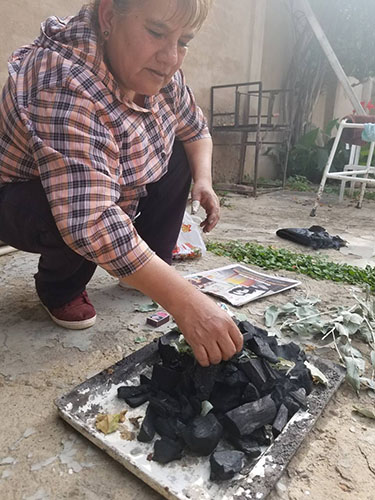 On Martes ch’alla my aunties called on me insisting I come to ch’allar their house, but I was uncertain if I should go. All of us had returned with miserable head colds from the trips we took over carnaval weekend. Although officially Bolivia was still coronavirus free, none of us harbored any illusion that the national health system would be up to the task of testing and tracing to accurately track the advance of the disease. In the absence of information to guide our decisions, we were left suspended in a state of viral uncertainty.
On Martes ch’alla my aunties called on me insisting I come to ch’allar their house, but I was uncertain if I should go. All of us had returned with miserable head colds from the trips we took over carnaval weekend. Although officially Bolivia was still coronavirus free, none of us harbored any illusion that the national health system would be up to the task of testing and tracing to accurately track the advance of the disease. In the absence of information to guide our decisions, we were left suspended in a state of viral uncertainty.
As we all prepared to face indefinite uncertainty and confinement, friends exchanged messages of consolation. A long-time friend and interlocutor, Sebastián[1] reassured me that we would get through this, because anybody who lived through what we’ve lived through has experienced weathering a crisis. He was referring to a political crisis that rocked Bolivia in October and November of 2019, precipitated when apparent irregularities in the October presidential elections cast doubt on the victory of once popular left-wing president Evo Morales, who was running for a controversial fourth consecutive term. 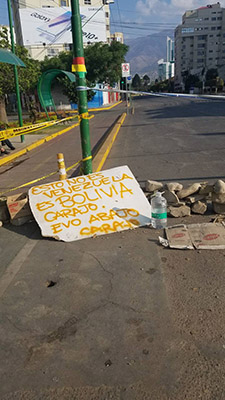 The protests that ensued became rapidly appropriated by the extreme right wing and ascendant fascist youth movements, and Morales was eventually forced to resign and flee to Mexico in the face of his government’s stunning loss of control of the country, which some refer to as a coup.
The protests that ensued became rapidly appropriated by the extreme right wing and ascendant fascist youth movements, and Morales was eventually forced to resign and flee to Mexico in the face of his government’s stunning loss of control of the country, which some refer to as a coup.
As the right wing seized power under the presidency of previously obscure senator Jeanine Áñez, an alarming spasm of state violence ensued. Military leaders who had declined to prop up the faltering Morales government, professing a reluctance to turn their arms on Bolivian civilians, were replaced with others who had no such scruples. In the week following Áñez’s ascension, at least 31 people were killed by security forces undertaking a campaign of “pacification,” shielded by a presidential decree granting them criminal impunity for the carnage. Though the Morales government had been fairly criticized for impinging on press freedoms, the Áñez regime has weaponized Cold War-era statutes to charge enemies and critics with “sedition” and “terrorism,” rendering the national press corps—never an especially trusted institution—even less capable of challenging the powerful.
The onset of the COVID crisis in Bolivia has played out for many as a repetition of the political crisis. The anxious hoarding of food by those with the resources to do so and the crushing blow of economic disruptions inflicted against the country’s precarious working class are both familiar. So too is the militarization of society in response to the virus, and the economies of blame that have emerged in its wake. In the first few days of the national quarantine, the press circulated stories blaming the communities of El Alto and El Chapare—bastions of support for Morales’s political party that suffered massacres by security forces in the days after his ouster—for reportedly failing to comply with the quarantine. The difficult task of navigating media landscapes in order to understand events as they unfold creates another register of viral uncertainty, which I also experienced in the chaotic days before and after the collapse of the Morales government. On top of uncertainty about the future engendered by the virus itself, information often comes in the form of viral content, the reliability of which is difficult to discern and necessarily subjective. In a climate of widespread and well-founded mistrust of the institutional press, social media expands to fill the vacuum, leaving one no choice but to attempt to divine the truth from the swirling mash of innuendo, forgery, wishful thinking, and genuinely valuable guerrilla journalism in endless WhatsApp messages.
Putting the House in Order with Firmness: Care and Authority from Climate Change to COVID
The dissertation fieldwork that I came to Cochabamba to carry out concerned the tension between the state’s function as a provider of care and its potential to exercise coercive force, which I saw emerging in state-led reactions to the threat posed by climate change. I carried out preliminary fieldwork in Cochabamba in the fall of 2015, when the seasonal rains that refresh aquifers and reservoirs relied upon by farmers and urban populations alike catastrophically failed. In response to the crisis—officially declared to be a climate emergency—the government appropriated water from rural spaces to inject into urban water utilities that were notorious for serving wildly disproportionate volumes of water to wealthy and well connected neighborhoods.
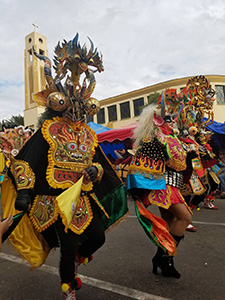 I was particularly concerned with how the state’s role as a caregiver vis-á-vis the provision of water intensified at the same time that it transferred responsibility to care for a future in which climate change adversely impacts the availability of freshwater—promoted with the official slogan cuidemos el agua, let’s care for or be careful with water—was transferred onto the backs of popular classes whose practices in relation to water came to be construed as “wasteful.” Among these is the practice of water play during carnaval time in Cochabamba. Carnavales have been classically described as rituals of reversal, times when usual rules of social order are suspended or turned upside down.
I was particularly concerned with how the state’s role as a caregiver vis-á-vis the provision of water intensified at the same time that it transferred responsibility to care for a future in which climate change adversely impacts the availability of freshwater—promoted with the official slogan cuidemos el agua, let’s care for or be careful with water—was transferred onto the backs of popular classes whose practices in relation to water came to be construed as “wasteful.” Among these is the practice of water play during carnaval time in Cochabamba. Carnavales have been classically described as rituals of reversal, times when usual rules of social order are suspended or turned upside down.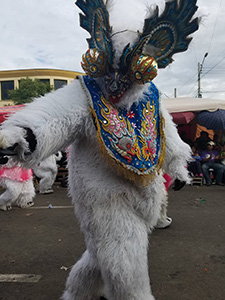 People in Cochabamba routinely experience water cuts and shortages, but in carnaval time a family that anxiously watches the water meter all year long might send their children into the streets with buckets and squirt guns and water balloons as the city erupts in a collective water fight.
People in Cochabamba routinely experience water cuts and shortages, but in carnaval time a family that anxiously watches the water meter all year long might send their children into the streets with buckets and squirt guns and water balloons as the city erupts in a collective water fight.
Last February, I sat at the kitchen table with my auntie Rita as she fondly recalled carnaval play in her neighborhood when she was a teenager, a time when neighbors who rarely spoke renewed their acquaintances by splashing each other with buckets and pans around the drainage ditch that overflowed with the last gifts of the rainy season. She and others in Cochabamba had been asked to exchange these acts of “irrational” expenditure and public conviviality for fastidiousness and frugality, as police patrolled the streets enforcing a ban against water play. 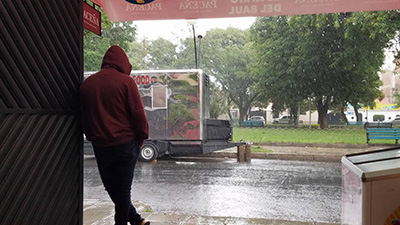 Meanwhile, in the well-heeled neighborhoods on the city’s north side, luxury real estate boomed in these years. High-rise buildings, with the increasingly common amenity of swimming pools, sprouted up amidst lush, shady parks.
Meanwhile, in the well-heeled neighborhoods on the city’s north side, luxury real estate boomed in these years. High-rise buildings, with the increasingly common amenity of swimming pools, sprouted up amidst lush, shady parks.
The Áñez government has framed its coronavirus response as simultaneously an act of war and an act of care. The state declared it has “militarized”—a term with unclear legal or practical implications—several regions especially hard-hit by the coronavirus. A pervasive militaristic rationale transforms the sick and those who may become sickened into enemies of the state, as the armed forces are again marshalled to combat “rule breakers” blamed for spreading illness. Militaristic spectacles of control mingle with gendered spectacles of care that center around the figure of Áñez herself. When announcing the national quarantine, she implored “I ask you as a mother, please stay in your homes.” A campaign ad for Áñez’s Juntos party runs ad nauseum on local TV stations, featuring her entering a house that has apparently been ransacked, where she begins to poner en orden la casa (put the house in order), righting overturned furniture, straightening crooked wall hangings, and delicately arranging throw pillows. On March 30th, Áñez told the press, “It’s our task to establish order with firmness, and that’s how we’re going to do it.”
Reflecting on the militarized response to the coronavirus, I agree with Catherine Lutz, who has cautioned about the anti-democratic implications of pervasive war metaphors and militarization in response to social problems (Lutz 2001; 2002). The implosion of militarism with care, and the enrollment of the repressive apparatuses of the state in the sacralized task of saving lives through enforcing the quarantine beg questions about emerging valences of care. Recent feminist theory complicates received notions of care as necessarily or straightforwardly benevolent (Puig de la Bellacasa 2017). As other researchers have shown, efforts to extend care, even those that are apparently well-intended, may be received as both repressive and uncaring (Stevenson 2014)—particularly when care is construed according to simplistic legible metrics and the bare biopolitical mandate of keeping bodies alive.
Over the course of my research on climate change, I have come to see care as a deeply ambiguous terrain, encompassing relations both benign and incipiently authoritarian. In the face of the state’s militarism, activists in Cochabamba are attempting to recuperate care as a source for alternative ethics. A collectively authored statement they released titled Queremos Cuidarnos, No Hacer Una Guerra: No Somos Nuestros Propios Enemigos (We Want to Take Care of Each Other, Not Make War: We Are Not Our Own Enemies) attempts to re-imagine the imperatives of care along anti-authoritarian principles. Time will tell if their efforts can reshape the challenge of the current moment, inciting compassion, solidarity, and a rejection of the impulse to blame and punish.
[1] All names used in this essay apart from those of public officials are pseudonyms.
Spanish editing by Alfredo Castil and Dr. Carlos Gonzalo Acevedo
References
Lutz, Catherine. 2001. Homefront: A Military City and the American Twentieth Century. Boston, MA: Beacon Press.
Lutz, Catherine. 2002. “Making War at Home in the United States: Militarization and the Current Crisis.” American Anthropologist 104 (3):723-735.
Puig de la Bellacasa, Maria. 2017. Matters of Care: Speculative Ethics in More than Human Worlds. Minneapolis, MN: University of Minnesota Press.
Stevenson, Lisa. 2014. Life Beside Itself: Imagining Care in the Canadian Arctic. Berkeley, CA: University of California Press.

3 Trackbacks